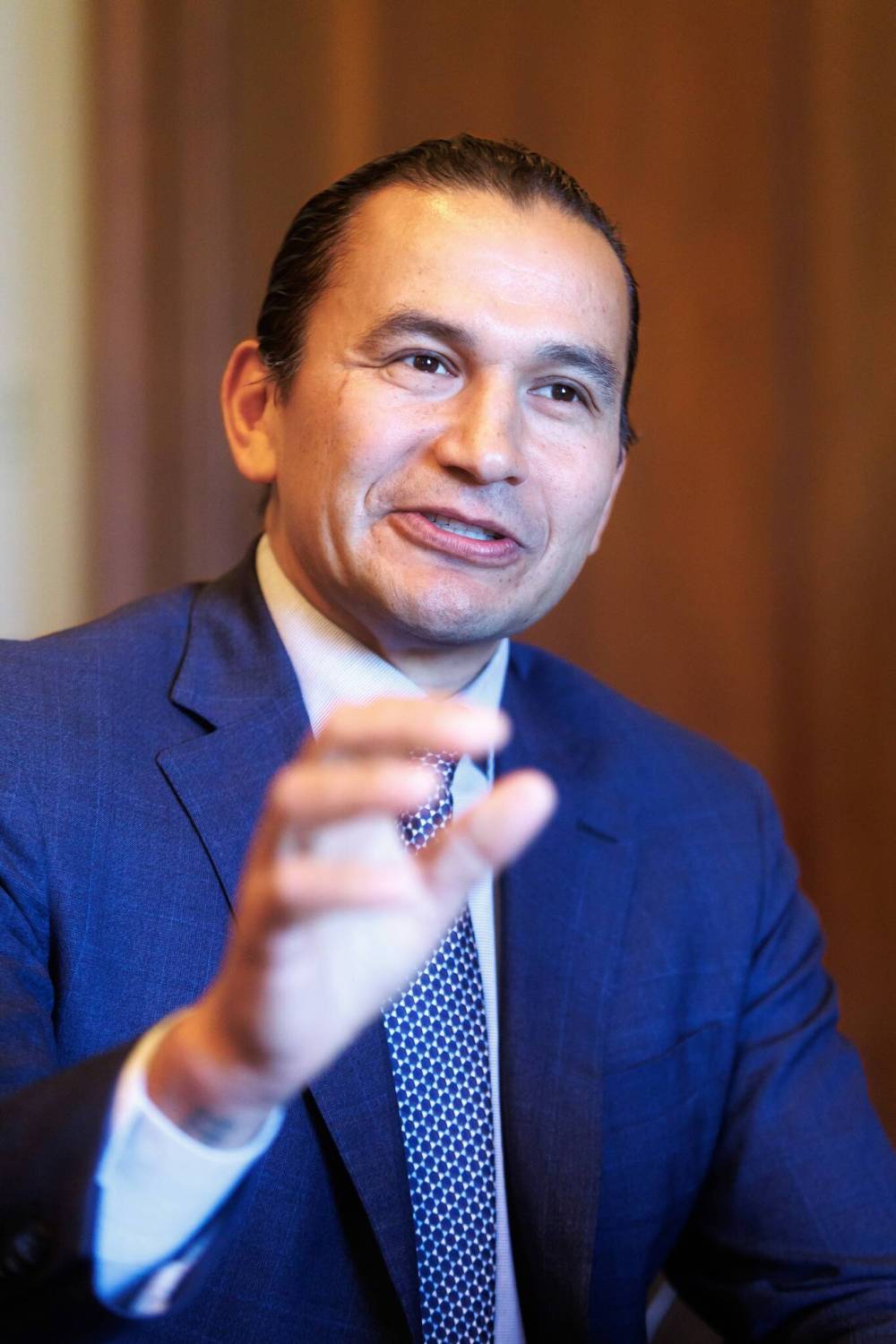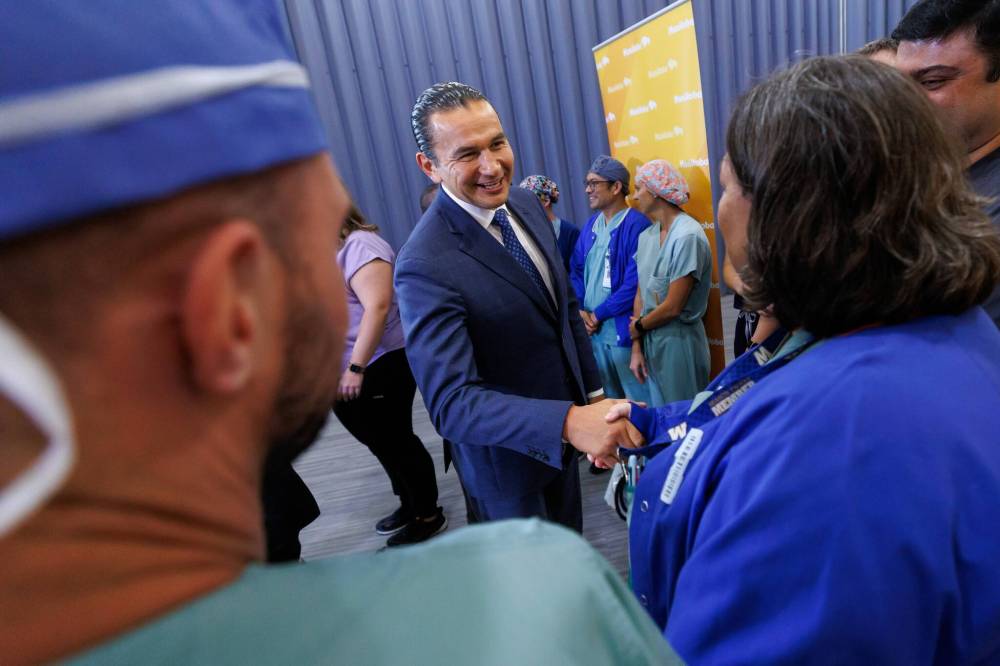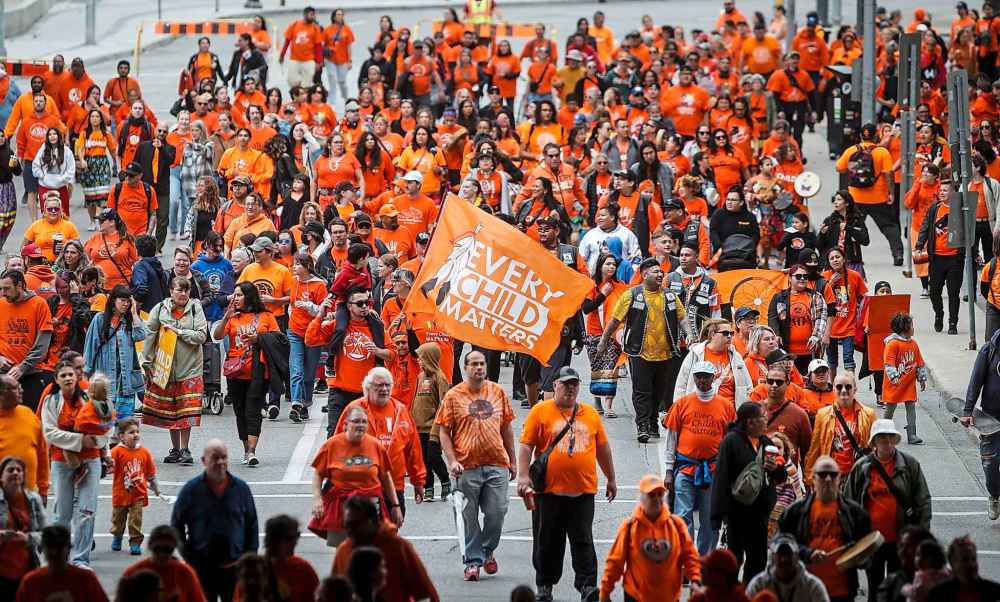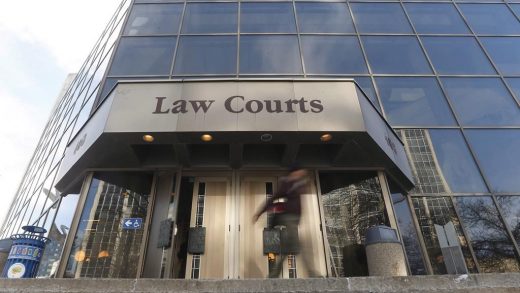
One year after being elected, Premier Wab Kinew can point to a long list of campaign promises kept: the gas tax holiday, hiring more health-care workers, a school nutrition program and free prescription contraceptives among them.
“It’s been a pretty eventful year,” said Kinew, who continues to ride high in popularity polls since he was sworn in after the Oct. 3 Manitoba provincial election.
The premier says there’s more work to do and maintains a promise to balance Manitoba’s books by the end of the NDP government’s first term. That’s despite public accounts released last week that show the province in a structural deficit and spending way beyond its means.
During the 2023-24 fiscal year, Manitoba posted its highest non-pandemic deficit ever at nearly $2 billion, with almost $2.2 billion in annual debt servicing costs.

Premier Wab Kinew believes his government is on
‘a path to balance’ the budget in its first term.
Still, Kinew remains convinced his government is on “a path to balance” the budget in its first term.
“The rating agencies that look at our books have given us positive reviews so far,” said Kinew, who studied economics at university.
“The average family out there — you’re tightening your belts, so I think it’s responsible for your government to be going through the same sort of exercise. It’s got to be a balanced approach,” he said, without explaining where the government plans to reduce spending.
“Over a three-year time horizon, nominal revenue growth will intersect with the carefully managed expenditures of the government. Now let’s put that on a T-shirt,” he quipped.
“That’s basically the plan — we are going to be responsible with the investments we’re making.”
He said that includes “leaning into” staffing up the health-care system.
When asked about 25,000 health-care aides poised to strike on Oct. 8 for higher wages, Kinew called the workers important and said many Manitobans rely on them for home care and hospital care. “It’s important we get the balance right.”
He blamed the former Tory government for freezing public sector wages and not hiring enough health-care aides. “Staffing ratios became really challenging.”

Premier Wab Kinew is greeted by health-care staff at the Grace Hospital in Winnipeg prior to announcing the Manitoba government is more than halfway to its goal of hiring 1,000 net new health-care workers.
Kinew defended the latest contract offered to health-care aides, saying it includes a wage increase that is 2 1/2 times what was offered under the former government. That proposal was rejected by members of the Canadian Union of Public Employees Local 204 and the Manitoba Government and General Employees’ Union.
Kinew also defended the gas tax holiday, which suspended the 14-cents-per-litre fuel tax on Jan. 1. It’s expected to cost Manitoba an estimated $340 million in lost revenue this year. Critics have said it rewards those who drive gas guzzlers the most and does nothing to encourage a reduction in carbon emissions.
“We recognize the reality that people drive to work in this province, and that they drive for work,” Kinew said. While the province can “steer” people towards driving electric vehicles, lifting the gas tax provided immediate relief for Manitobans feeling the pressure of high interest rates and inflation, he said.
“In one area where we had a lever, we pulled it and it made a difference for Manitoba.” He said the move lowered inflation ahead of the rest of the country.
With one year in the books, which also included creating a provincial statutory holiday for Orange Shirt Day on Sept. 30 and housing more than 1,000 Manitobans, “it’s not mission accomplished,” Kinew said.

The National Day of Truth and Reconciliation, also known as Orange Shirt Day, is now recognized as a provincial statutory holiday.
He stands by his oft-cited metaphor of the economic horse pulling the social cart — that health care, education and social investments must be hitched to a healthy, growing economy.
“We’re building our cost structure for the next few years here in Manitoba,” the premier said. “We’re trying to be business-friendly and set the stage for economic growth here. When we look out to 2027, we’ve got a path to balance by keeping all those things in mind.”
Another campaign promise, that of freezing Manitoba Hydro rates, is still on the to-do list, Kinew said — on the same day the Crown corporation posted a net loss of $157 million for 2023-24 after experiencing drought conditions for the second time in three years.
“The energy policy that we rolled out recently, I think, sets the stage for a future hydro rate freeze,” the premier said. It includes “nation-to-nation” partnerships with Indigenous communities to develop 600 megawatts of wind energy, with another 400 megawatts of electricity coming from retrofits to improve energy efficiency and demand-side management.
“We all want to do right by the climate and see low-carbon industries flourish,” he said.
“This is the kind of job you can only learn by doing: political lessons, practical lessons, team leadership lessons.”–Premier Wab Kinew
As for lessons learned over the first 365 days in office, Kinew said there’s been “a ton.”
“This is the kind of job you can only learn by doing: political lessons, practical lessons, team leadership lessons.”
While Kinew maintained turfing Fort Garry MLA Mark Wasyliw from caucus was justified, he apologized to Gerri Wiebe and other defence lawyers during question period Wednesday. Wasyliw, a defence lawyer, was booted last month over his association with Wiebe, the lawyer representing convicted sex offender Peter Nygard. The move made headlines across Canada and raised the ire of lawyers in Manitoba and elsewhere. Kinew said he would be willing to have a conversation with members of the legal community who were offended.
What stood out most in his first year on the job?
“The unity and the hunger for positivity amongst Manitobans,” Kinew said. “The election was very nasty and very divisive” and he worried such animosity would continue past Oct. 3.
“That’s not what happened at all. Manitobans just moved on. So much of the static and negativity and divisiveness fell away, and instead we were greeted with open minds and open hearts and a province willing to work with us.”

Carol Sanders
Legislature reporter
Carol Sanders is a reporter at the Free Press legislature bureau. The former general assignment reporter and copy editor joined the paper in 1997. Read more about Carol.
Every piece of reporting Carol produces is reviewed by an editing team before it is posted online or published in print — part of the Free Press‘s tradition, since 1872, of producing reliable independent journalism. Read more about Free Press’s history and mandate, and learn how our newsroom operates.
Our newsroom depends on a growing audience of readers to power our journalism. If you are not a paid reader, please consider becoming a subscriber.
Our newsroom depends on its audience of readers to power our journalism. Thank you for your support.


